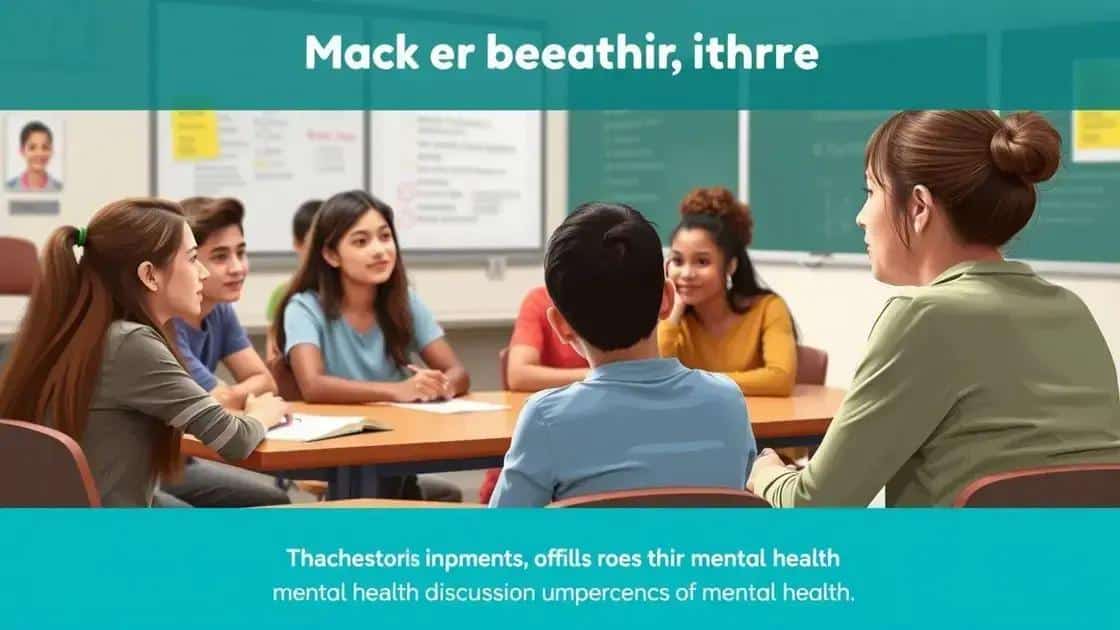Student mental health services funded by federal grants

Student mental health services funded by federal grants improve academic success by providing crucial support, enhancing focus, attendance, and overall performance in schools.
Student mental health services funded by federal grants are vital in providing essential support for students navigating their mental health challenges. Whether you’re a student, educator, or parent, exploring these resources can lead to healthier academic journeys.
Understanding the funding for student mental health services
Understanding the funding for student mental health services is essential for optimizing support options for students. Federal grants play a pivotal role in helping schools provide these critical services. Knowing how this funding works can help you access the resources available.
Types of Federal Funding
Federal funding comes from various sources, each designed to address unique needs. Among the most significant sources are:
- Title IV programs, focused on enhancing mental health services in education.
- Substance Abuse Prevention and Treatment Block Grant, crucial for integrating mental health with substance abuse support.
- Pell Grants that sometimes include components for mental health initiatives.
These different funding options can significantly impact the services available to students, ensuring they receive the support they need.
Funding Allocation Processes
The allocation of federal funds follows a structured process. Schools must apply for these grants, demonstrating a need for mental health services. This often involves:
- Conducting needs assessments to identify mental health challenges.
- Submitting detailed proposals outlining how these funds will be used.
- Collaborating with community organizations to strengthen the application.
By following these steps, schools can maximize their chances of receiving funding.
In addition to federal grants, states often provide their own funding to enhance school mental health services. This collaboration can lead to more comprehensive support for students.
When schools successfully secure funding, they can implement programs that directly address students’ needs. This includes hiring trained mental health professionals and providing resources like workshops and counseling sessions.
How federal grants are allocated to schools

Understanding how federal grants are allocated to schools is key for maximizing access to mental health services. The process ensures that funds reach the institutions that need them the most. Each year, schools can apply for federal grants that specifically support mental health initiatives.
The Application Process
The application process involves several steps. Schools must complete a thorough application to demonstrate their need for funding. This typically includes:
- Documenting current mental health service needs through surveys and assessments.
- Outlining plans for utilizing the funds effectively.
- Collaborating with local organizations for a stronger application.
Successful applications highlight not just the needs but also the potential impact on students’ well-being.
Criteria for Allocation
When assessing applications, the federal government considers various criteria. Grant reviewers look at factors like the:
- Severity of identified mental health issues among the student population.
- Proposed use of funds for sustainable programs.
- Evidence of community support for mental health services.
These criteria help prioritize schools that demonstrate a commitment to improving student mental health.
Once funding is approved, schools then receive their grants in installments based on projected spending and service implementation timelines. This structured approach ensures accountability while allowing flexibility in how funds are used to meet student needs. Schools can adapt their programs as they gather feedback, ensuring that mental health services are effective and responsive.
Understanding this allocation process empowers schools to effectively advocate for the mental health resources they need. With clear strategies in place, schools can enhance their support systems and create healthier environments for students.
Programs and resources available to students
Students have access to a variety of programs and resources designed to support their mental health. These programs provide essential services that address the unique challenges faced by students today. By understanding what is available, students can take advantage of beneficial services to enhance their well-being.
Types of Mental Health Programs
Various types of programs cater to different student needs. Some of the most common include:
- Counseling Services that provide professional mental health support on campus.
- Peer Support Programs where students can share experiences and receive guidance from their peers.
- Workshops focused on stress management, coping skills, and self-care.
These programs help create a supportive environment for students navigating their mental health journeys.
Online Resources and Hotlines
In addition to in-person support, numerous online resources are available. Students can access:
- Virtual counseling platforms that offer remote therapy sessions.
- Helplines that provide immediate assistance for those in crisis.
- Webinars and online courses focusing on mental wellness.
These resources help ensure that help is available anytime and anywhere, making it easier for students to seek assistance.
Another valuable aspect of these programs is the integration with educational achievements. Mental health resources often emphasize the connection between well-being and academic performance. Many schools implement practices that promote mental wellness as a method to improve overall student success. Programs addressing anxiety, depression, and other mental health issues can lead directly to better learning environments and academic outcomes. This holistic approach shows how essential it is to prioritize mental health in educational settings.
The impact of these services on academic success

The impact of student mental health services on academic success is significant. These services provide essential support that can help students thrive in their educational journeys. When students have access to mental health resources, they are more likely to perform better academically.
Benefits of Mental Health Support
Improved mental health can lead to various positive outcomes in school. Some of these benefits include:
- Enhanced focus and concentration in class.
- Better attendance rates, as students feel more equipped to face challenges.
- Higher grades and overall academic performance.
When students feel supported, they can engage more meaningfully in their studies. This support often translates into improved classroom behavior and a more positive school environment.
Reducing Barriers to Learning
Mental health services also play a vital role in removing barriers that may hinder learning. Students dealing with anxiety, depression, or stress can struggle to keep up with their peers. By addressing these issues, schools help students overcome challenges that affect their education. Access to counseling and peer support can make a difference in how students cope with stressors.
Furthermore, when schools provide workshops and resources that teach coping mechanisms, students become better prepared to handle academic pressures. Learning skills such as time management and stress relief allows them to maintain a balanced life. This balance is essential for achieving long-term success.
Additionally, mental health services foster a culture of awareness and understanding among students. When students learn about mental health, they can recognize their own struggles and seek help when needed. This proactive approach contributes to an overall healthier student body, aligning with better academic outcomes.
FAQ – Frequently Asked Questions about Student Mental Health Services
How do mental health services impact academic performance?
Mental health services support students by improving focus, boosting attendance, and enhancing overall academic success.
What types of programs are available for students?
Programs include counseling, peer support, workshops, and online resources that help address mental health challenges.
How can students access these services?
Students can access services through their school’s counseling office, online platforms, and community resources.
What role do teachers play in supporting mental health?
Teachers help by promoting awareness, recognizing student needs, and encouraging students to seek help when necessary.





